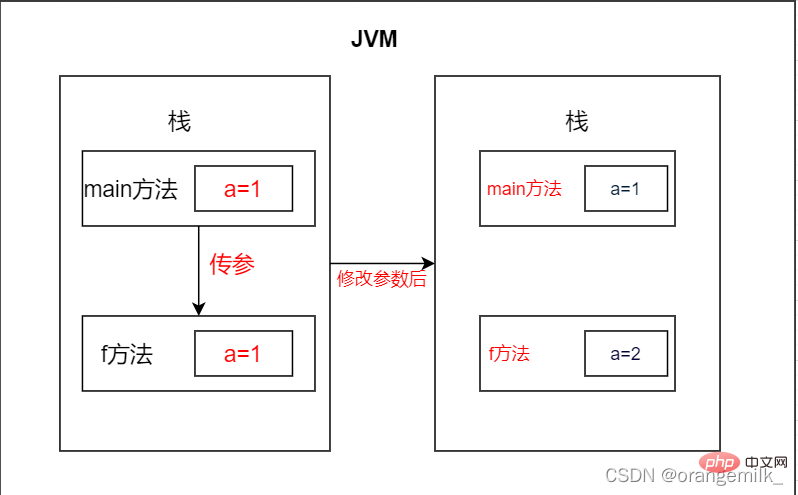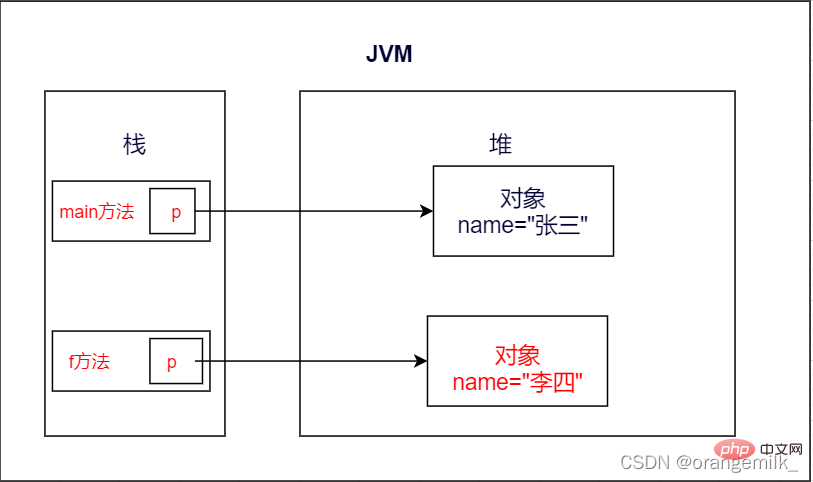Let's analyze whether Java is passed by value or by reference.
This article brings you relevant knowledge about java, which mainly introduces the relevant issues about whether Java is passed by value or passed by reference. Let's take a look at it together. I hope it will be helpful to everyone. helpful.

Recommended study: "java Video Tutorial"
Purpose of the article: Verify whether the Java language is pass by value or pass by reference and Java Implementation principle of parameter passing.
Problem introduction:
Read the code segment first:
public static void main(String[] args){
Person p=new Person("张三");
f(p);
System.out.println("实参:"+p);}public static void f(Person p){
p.name="李四";
System.out.println("形参:"+p);}Running result:
Formal parameters :Person{name="李思"}
Actual parameters:Person{name="李思"}
We pass an object variable to the method, and then modify the object within the method Attributes, print actual parameters and formal parameters, on the surface, the values of the actual parameters and formal parameters have been modified.Does Java also support reference transfer?
| The answer is: Java language only supports value transfer and does not support reference transfer. |
Before verifying the Java parameter transfer method, we First, you must understand the difference between function value passing and reference passing.
- Pass by value means copying a copy of the actual parameters and passing them to the function when calling the function, so that if Modifying parameters will not affect the actual parameters.
- Pass by reference refers to passing the address of the actual parameters directly to the function when calling the function. Then the modification of the parameters in the function will affect the actual parameters.
It can be seen that the difference between value passing and reference passing is whether the modification of the formal parameters will affect the actual parameters
1. Basic Parameter passing of data type
We pass a basic data type to the method, and then modify the value of the formal parameter in the method, and find that the modification of the formal parameter does not affect the actual parameter.
public static void main(String[] args){
int a=1;
f(p);
System.out.println("实参:"+a);}public static void f(int a){
a=2;
System.out.println("形参:"+a);}2. Parameter passing of reference data types
In the example introduced by the question, it seems that the modification of the formal parameters affects the actual parameters, but as long as we create a new object and assign it to the formal parameters, then Print actual parameters and formal parameters, the two do not affect each other. It means that Java does not conform to reference transfer.
public static void main(String[] args){
Person p=new Person("张三");
f(p);
System.out.println("实参:"+p);}public static void f(Person p){
p=new Person("李四");
System.out.println("形参:"+p);}3. Principle
We need to understand why this happens Phenomenon, you need to understand the basic principles behind Java:
The JVM is divided into many areas, the objects we create are placed on the heap, and basic data types and local variables are placed on the stack. When passing the basic data type, a copy of the data is created and passed to the method, so the actual parameters will not be affected by the modification of the formal parameters, as shown in the figure:

Since the object is placed In the heap area, so we can only use the reference of the object to operate this object.
When the object reference is passed to the method, a copy of the reference is actually created and points to the same object at the same time. When the object is manipulated through the formal parameter reference , it’s like the actual parameters have changed. In fact, the object content has changed, but the object variables have not changed, and the actual parameters themselves have not changed. Therefore, the example introduced in the question is not difficult to understand.

When we reassign the formal parameters, the actual parameters will not be affected in any way. At this time, the actual parameters and the formal parameters already point to two different objects.
Therefore, Java only supports value transfer.
Recommended learning: "java video tutorial"
The above is the detailed content of Let's analyze whether Java is passed by value or by reference.. For more information, please follow other related articles on the PHP Chinese website!

Hot AI Tools

Undresser.AI Undress
AI-powered app for creating realistic nude photos

AI Clothes Remover
Online AI tool for removing clothes from photos.

Undress AI Tool
Undress images for free

Clothoff.io
AI clothes remover

AI Hentai Generator
Generate AI Hentai for free.

Hot Article

Hot Tools

Notepad++7.3.1
Easy-to-use and free code editor

SublimeText3 Chinese version
Chinese version, very easy to use

Zend Studio 13.0.1
Powerful PHP integrated development environment

Dreamweaver CS6
Visual web development tools

SublimeText3 Mac version
God-level code editing software (SublimeText3)

Hot Topics
 1377
1377
 52
52
 Perfect Number in Java
Aug 30, 2024 pm 04:28 PM
Perfect Number in Java
Aug 30, 2024 pm 04:28 PM
Guide to Perfect Number in Java. Here we discuss the Definition, How to check Perfect number in Java?, examples with code implementation.
 Random Number Generator in Java
Aug 30, 2024 pm 04:27 PM
Random Number Generator in Java
Aug 30, 2024 pm 04:27 PM
Guide to Random Number Generator in Java. Here we discuss Functions in Java with examples and two different Generators with ther examples.
 Weka in Java
Aug 30, 2024 pm 04:28 PM
Weka in Java
Aug 30, 2024 pm 04:28 PM
Guide to Weka in Java. Here we discuss the Introduction, how to use weka java, the type of platform, and advantages with examples.
 Smith Number in Java
Aug 30, 2024 pm 04:28 PM
Smith Number in Java
Aug 30, 2024 pm 04:28 PM
Guide to Smith Number in Java. Here we discuss the Definition, How to check smith number in Java? example with code implementation.
 Java Spring Interview Questions
Aug 30, 2024 pm 04:29 PM
Java Spring Interview Questions
Aug 30, 2024 pm 04:29 PM
In this article, we have kept the most asked Java Spring Interview Questions with their detailed answers. So that you can crack the interview.
 Break or return from Java 8 stream forEach?
Feb 07, 2025 pm 12:09 PM
Break or return from Java 8 stream forEach?
Feb 07, 2025 pm 12:09 PM
Java 8 introduces the Stream API, providing a powerful and expressive way to process data collections. However, a common question when using Stream is: How to break or return from a forEach operation? Traditional loops allow for early interruption or return, but Stream's forEach method does not directly support this method. This article will explain the reasons and explore alternative methods for implementing premature termination in Stream processing systems. Further reading: Java Stream API improvements Understand Stream forEach The forEach method is a terminal operation that performs one operation on each element in the Stream. Its design intention is
 TimeStamp to Date in Java
Aug 30, 2024 pm 04:28 PM
TimeStamp to Date in Java
Aug 30, 2024 pm 04:28 PM
Guide to TimeStamp to Date in Java. Here we also discuss the introduction and how to convert timestamp to date in java along with examples.
 Create the Future: Java Programming for Absolute Beginners
Oct 13, 2024 pm 01:32 PM
Create the Future: Java Programming for Absolute Beginners
Oct 13, 2024 pm 01:32 PM
Java is a popular programming language that can be learned by both beginners and experienced developers. This tutorial starts with basic concepts and progresses through advanced topics. After installing the Java Development Kit, you can practice programming by creating a simple "Hello, World!" program. After you understand the code, use the command prompt to compile and run the program, and "Hello, World!" will be output on the console. Learning Java starts your programming journey, and as your mastery deepens, you can create more complex applications.




